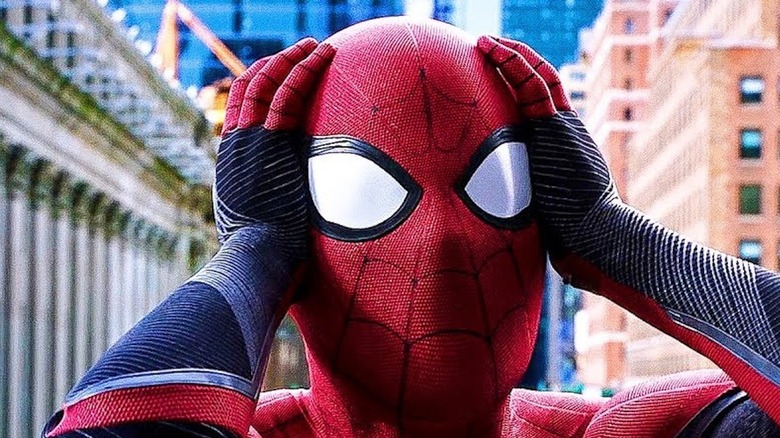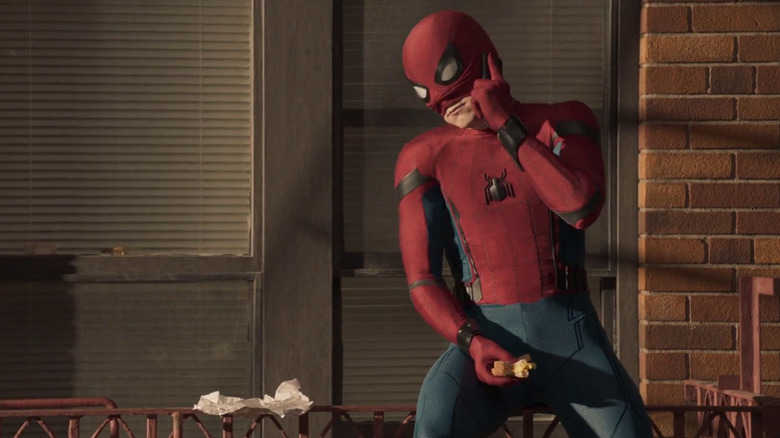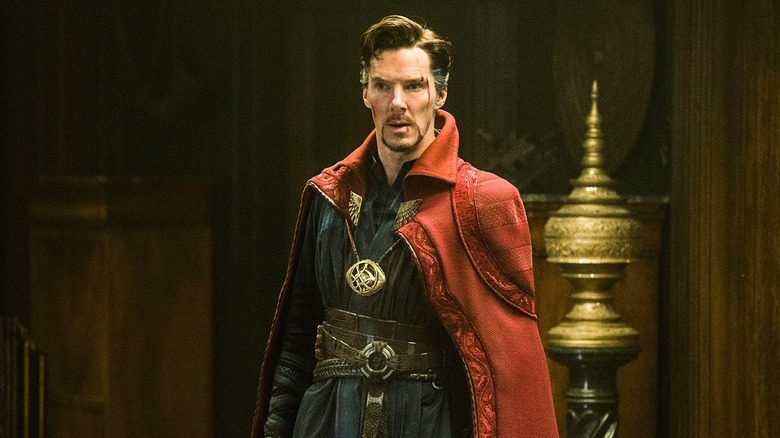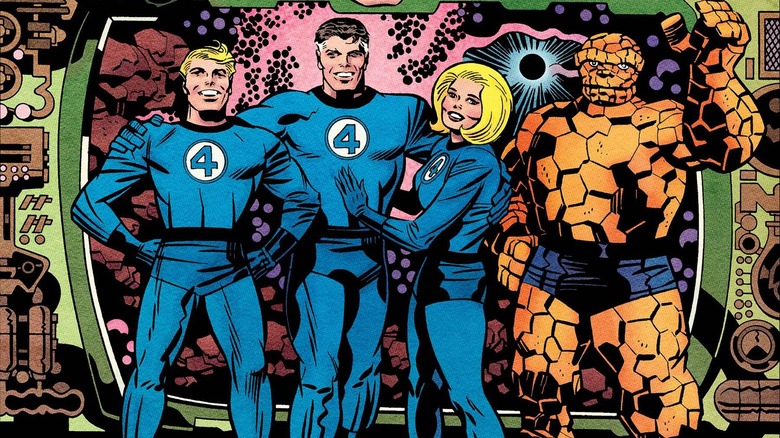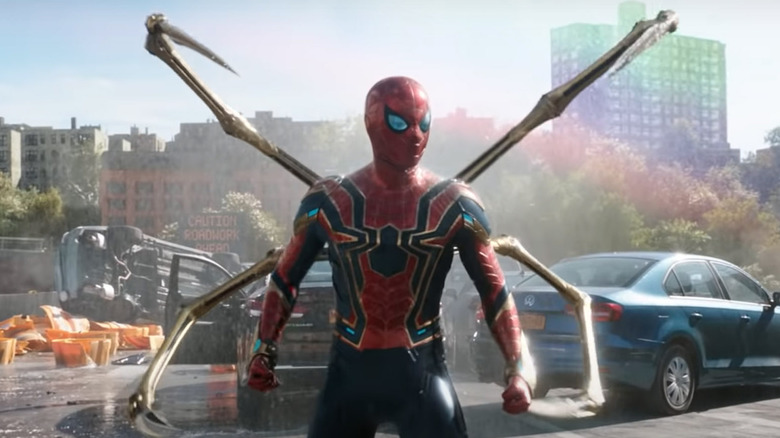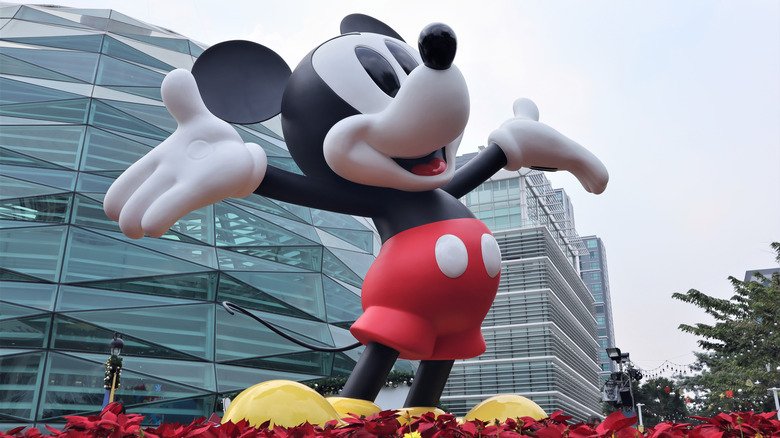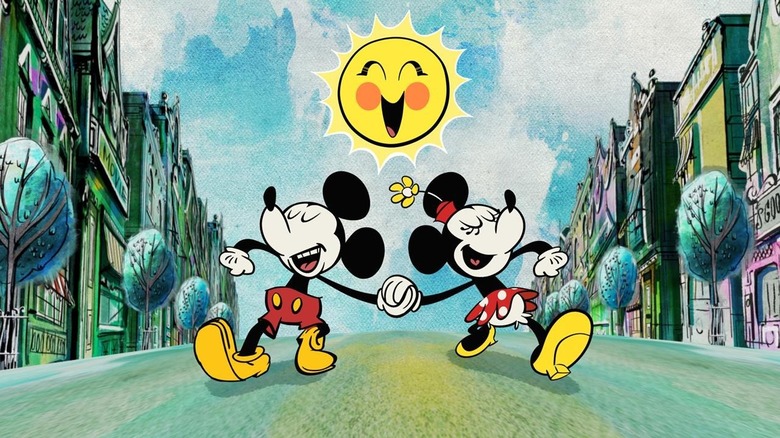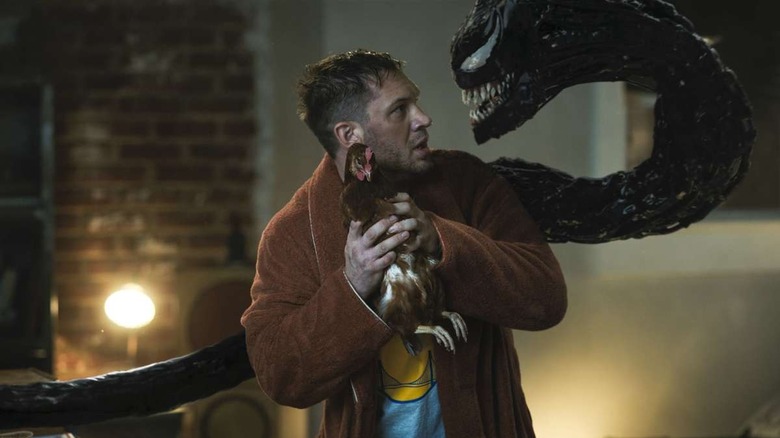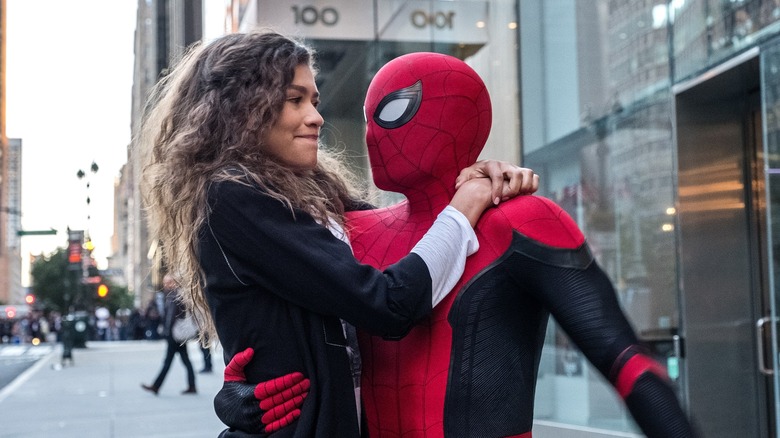Who Owns Spider-Man? A Comprehensive Explainer Of The Marvel Copyright Lawsuit
It's near-impossible to pass through our universe without coming into contact with superhero media. If you like "Seinfeld," you've heard of Superman, if you like Broadway, you've heard of Spider-Man, and if you've read a media website, you've heard a director's thoughts on the MCU. Superheroes are not just beloved, but lucrative, and though the mythos of their creation is often romantic, it's also fodder for complicated legal cases. In the 1960s and 1970s, Marvel writers and artists were pumping out pages awash with beloved characters that now monopolize our big screens. As of 2009, these characters are property of Disney. And this week, the original creators of characters like Black Widow, Iron Man, and Spider-Man, have invoked a 1978 slice of US Copyright law to try and get their hands on the rights.
Does this mean the MCU will be in production limbo like "Friday the 13th"? Probably not. Though increasingly complex, these copyright claims will not likely result in too many hiccups for Disney. Following the thread of Spider-Man's ownership, we're going to break down why.
What's the Legal Case About?
The situation with the Marvel creators is all about US Copyright law (and therefore would only affect copyright in the US). This law has been changed a few times by congress, often at the behest of Disney (more on that later). In 1976, the law was changed to even out bargaining power for creators. To compensate for the fact that creators cannot fathom how valuable their work will be over time, congress created an ability to terminate sold copyright after a set number of years. Different sections apply to works created before or after 1978, which is what makes this one different from the "Friday the 13th" case. Works created before 1978 use Title 17 Section 203 of the US Copyright Code, and works created after use Section 304 of the same.
Multiple Marvel creators (or their Estates) have served termination notices (as required to get the rights back to their original characters) and Marvel Characters Inc. ("Marvel," a previously independent entity that was purchased by Disney in 2009) has filed complaints to bar them from doing so. There are multiple defendants, including Lawrence D. Lieber, Keith A. Dettwiler (on behalf of the Estate of Donald L. Heck), and Patrick S. Ditko (on behalf of the Estate of Stephen J. Ditko). These cases are substantially similar, so for the purposes of deciphering who owns our favorite webslinger, let's focus on the Ditko claim.
To bar these termination notices, Disney is arguing that the creation of these characters was work for hire, and therefore, the creators never had any entitlement to the copyright and there's thus no sale to terminate.
What's the Deal with "Work for Hire"?
The key issue in this case is the difference between work and work for hire. There is a test that the court must apply when considering the nature of work, but the difference is about whether or not Ditko did his work as a Marvel employee or if he was an independent contractor at the time he created Spider-Man. If he was a Marvel employee at the time of the creation, then the work always belonged to Marvel and Ditko has no claim to Spider-Man, but if he was an independent contractor, he would have owned the copyright at some point and therefore has a claim to terminate the sale and get Spidey back.
This nuance is the same issue in the "Friday the 13th" case, though for works created before 1978, the court uses the "instance and expense" test, a different standard than the one that was used for "Friday the 13th." As a result, the decision in that case doesn't have a lot of legal bearing on what will happen here, but it could signal the courts being more open minded to ruling in favor of creators. The test applicable to the Marvel case states "without a contrary agreement, a presumption arises that the intention of the parties was for the copyright to vest in the party whose instance and expense induced the work's creation." Sifting out the jargon, that means that unless there is anything specifically stating otherwise, the courts will assume that the copyright belongs to the party who induced the work at their instance and expense, in this case, Marvel inciting the creation of pages to be sold as comics. To fight that presumption, Ditko could produce such a "contrary agreement" but to date, there's been no mention of anything of the sort.
The frustration of this test is that it seems counterintuitive to the intention of the law congress drafted in 1978. Their intention was to give more rights back to creators, but as the test stands, it's near impossible for creators to invoke the law successfully. There's pressure to ask the court to change their approach, which is why these cases have so many eyes on them.
Marc Toberoff, the lawyer in this case, also argued the similar case involving Jack Kirby (and is also the lawyer representing the creator in the "Friday the 13th" case). This was settled before it saw the Supreme Court and Toberoff views the Marvel case as another attempt to pressure the Supreme Court to change the test for work for hire.
What Happened When Jack Kirby Tried?
About 10 years ago, the Estate of legendary comic book artist Jack Kirby filed a similar suit against Marvel which was decided by the Second Circuit Court in 2013.
In this instance, the courts looked closely at what they called the "Marvel Method" wherein Stan Lee created outlines that were used by the creators to make their comics, creating the collaboration between artists, writers, letterers, and so forth. As editor, Lee had the final word and therefore retained creative control. The Kirby case was settled before it made its way to the Supreme Court. If (and it's a big if) these cases made it to the Supreme Court, they could potentially change up the application of the "instance and expense" test, as mentioned above.
The "Friday the 13th" case was recently decided at the Second Circuit level, in favor of the original creator. Though it's unlikely to be certified, the studio could appeal to the Supreme Court which would allow for interested parties, like Marvel, to intervene. While legal minds would be elated at such an instance, since both cases use a different work for hire test, it's unlikely the outcome of that case would affect this one. That said, this decision could signal a shift in the courts' approach to protecting creators.
So What Happens if Disney Wins? What Happens if Ditko Wins?
The reality is that Disney is not going to lose the rights to your beloved superheroes, no matter how hard Thanos might snap. The key here is that these terminations can only seek joint-ownership of these characters. All of the characters in question, including Spider-Man, were technically created jointly with multiple writers, including Stan Lee who was, at the time, a salaried employee of Marvel. What that means is, if it turns out that these creators were freelancers for hire, they were creating with a Marvel employee, and therefore cannot claim complete ownership of the copyright at any point. So, if the terminations are successful, despite Marvel's pushback, they won't lose the ability to use the characters for future works, but might owe a share of the profits to these estates.
Disney and Copyright Law- Protecting Mickey from the Public Domain
A lot of mind is being paid to the fact that Disney has both capitalized off of public domain works (for most of its classic slate like "Peter Pan" and "Snow White") but has done lots of work to protect its own characters from such a fate. After a set number of years, copyright goes to the public domain, meaning anyone can use and adapt it. That's why we have so many iterations of Dracula and Sherlock Holmes, and how we ended up with "Night of the Animated Dead," a Romero-credit-less adaptation of "Night of the Living Dead."
In order to prevent Mickey Mouse from becoming a part of the public domain, Disney has, on multiple occasions, lobbied for extensions of copyright. It's an interesting note in this case since, if they hadn't, these Marvel characters would be in the public domain and not up for grabs by these estates.
That said, it doesn't feel exactly possible that Mickey would be up for grabs for anyone to slap on a t-shirt. That's because Disney filed trademarks to prevent that. In a lot of ways, this creates a perpetual copyright, which is, again, in contravention of the intention of copyright law.
How the Trademark Protected the Mouse and What that Means for Spidey
In order to protect Mickey from the public domain (which is where he'll land as of 2023), Disney has filed trademarks, and ensured they've bolstered them by putting Mickey on merchandise. This will allow them to assert that Mickey Mouse has a "secondary meaning" and will bar anyone from infringing on their trademarks to use Mickey.
How does this apply to Spider-Man? Well, much like Mickey, Disney holds multiple trademarks for the character's name and appearance. It's a little bit hairy as to how these things interact, and it hasn't been contemplated just yet, but the fact is that the copyright clause being invoked here only applies to the copyright and will not affect the trademarks. If Ditko is successful, Disney would still retain the trademarks, for instance, owning a trademark on the word "Spider-Man" and its use in movies, recordings, and video games.
If Disney Owns Spidey, How did Sony Make Those Movies?
One of the reasons this case is juicier than others is because the Marvel characters are so big, their rights have been split: comic books, video games, toys, merchandise, film rights ... they can each be sold to different entities. In the case of Spider-man, his film rights belong to Sony (as the result of a sale in 1998). There was a similar deal of characters' film rights being sold to Fox, which is why the X-men movies were in a different universe and why Marvel movies couldn't use the word "mutant" to describe anyone. Now that Disney owns Fox, they own the film rights to the X-men and The Fantastic 4 and can drop those characters wherever they want!
So how is Spidey in the MCU? Sony and Marvel (Disney) struck a deal in 2015 allowing them to split profits for Spider-man. That granted Marvel the ability to make Spider-Man movies by licensing the character from Sony. This deal did not, however, include every Spider-Man-related character, which is why Sony is still able to make Venom movies. The details of this deal aren't super public which, though frustrating, makes it fun to try and figure out what's really happening with the Sinister Six.
At one point, Sony owned the merchandising rights, which was very lucrative around the time of their films' releases. But in 2011, in need of some cash, they sold those rights back to Marvel. Making matters even more interesting, Sony and Disney recently struck a deal giving Disney+ streaming rights to their Spider-Man films.
So why does all of this matter? Because if the Estate of Ditko is successful in getting Spider-Man back (which, realistically, it won't be), there are a lot of convoluted things to consider. Between the trademarks in Disney's control and the separation of rights of the character, it's not as simple as getting the copyright back and calling it a day. If this one goes all the way, we can expect floods of law students sitting in a lot of board rooms doing a lot of document discovery trying to decipher this tangled web.
Who Owns Spider-man?
To evoke the famous words of every lawyer who's attempted to answer even the simplest of questions: it depends. The short answer: Disney. While there are some thrilling wildcards and longshots that could change the landscape of copyright law in the US, the reality is that these original creators would need to open a lot of portals to be successful in this fight. Though the new "Friday the 13th" decision signals a potential changing of the tides, even the result in that case will likely mean a rights split, which is what we would expect here. Spidey's ownership is split amongst multiple entities, and lies primarily in the hands of Disney, and even if Ditko's estate is successful, it will still only get a portion of the rights. Fans can likely rest easy knowing the MCU will tread on as expected.
